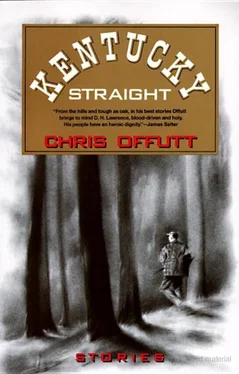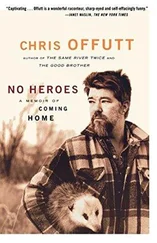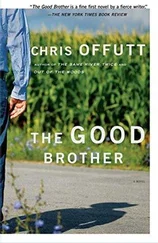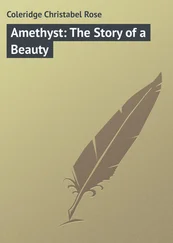The sun began its final slide behind the far hill when William stood, propped his rifle over his shoulder, and stepped into the deep shade of the woods. Connie expected him home by now. Their daughters would be in bed and he and Connie would lie on the couch and make silent love so as not to wake them. William glanced at the dimming sky and wished he hadn’t seen the snake-bit leg. Now he couldn’t shoot the man, and worse, he couldn’t just walk away.
William moved down the bank and climbed the knob, forcing himself not to look at the hemp. The man was small and wiry and William was surprised that he was so young. His eyes were wide as bottle caps.
“Copperhead got me,” said the man.
“Big or little?”
“Big.”
“You’re lucky. Babies are the worst.”
“Lucky,” said the man.
William opened his pocketknife and sliced the man’s pants along the seam.
“Got a lighter?” William said.
The man slid a sweaty hand into his pocket and handed William a blue book of matches. On its cover the coal company’s name was embossed in gold.
“I just work for them,” the man said. “I don’t own it.”
“Shut up.”
William lit a match and passed the knife blade through the flame. The shiny metal blackened. He straddled the man’s thigh and made a short, deep slit in his calf. He lifted the knife and turned his wrist to cut again. The two lines crossed at one of the holes left by the snake. William pressed his mouth to the wound. Sucked air squeaked, and liquid filled his mouth. He turned his head to spit and repeated the process on the other hole. William cut a patch from the man’s shirttail and covered the wound, tying it with strips of cloth. The man lay on his back, cheek against the dirt. Vomit pooled beside his face.
William spat until his mouth was dry, then ran his tongue along his gums to check for sores. He knew he’d swallowed some but that didn’t matter; stomach acid was stronger than venom. The man rustled dead leaves, struggling to sit.
“What’d they send you for?” William said. “They done mined this land out.”
“Just running tests.”
“Up here?”
“No. When the snake hit me, I came this way. Figured I’d build a fire and somebody’d see it.”
“You’d do that, wouldn’t you. You’d burn the woods down.”
“Nothing here but some kind of horseweed.”
The moon rose above the hemp as if towed by the setting sun. The man’s clothes were ripped from briars. A gold band glinted on his left hand, and William wondered if he had kids.
“Live in town?” William said.
“All my life,” the man said. “We’d like to move out, but I don’t know.”
“It ain’t easy around here.”
“Neither is town. Prices are high as a cat’s back.”
William reached for his rifle and stood. The man stopped talking, eyes growing wide again. He leaned back, breathing hard. William emptied the rifle of bullets, pulled the man to his feet, and handed him the gun.
“Use this to walk with,” William said. “You parked on the fire road?”
The man nodded.
“Try not to bang the scope.”
He led the man across the knob and down the back slope into the woods. Tree frogs ceased their noise. Night came over the eastern hills, passed the men, and seeped along the ridge. Starlight spread through open sky. At the foot of the hill, William squatted to drink from the creek. He waited for the man to thrash through heavy growth along the bank.
“Think I ought to wash my leg?” the man said.
“This water might not be the cleanest on account of the mines.”
“Then why are you drinking it?”
“All we got,” William said. “Ever notice how town water always tastes like pipe?”
“Never did,” said the man. “What’s your name?”
William stood quickly. “Got a mile to go, uphill.”
He began following the creek past tree roots slithering down the bank. A bobwhite call floated through the trees. William remembered that his father and grandfather had walked this creek home from the mines, and he was suddenly glad he’d had no sons. The responsibility of land would end with him. Men’s lives ran in bursts of work, drink, and quick death, while women wore down slow and steady, like a riverbank at a sharp curve. He’d urge his daughters to move, but they’d probably stay and give him grandsons. One day William would be old and telling a boy about helping a coal man who didn’t deserve it. He wondered what the state would find to outlaw in his grandsons’ time.
An hour later, William and the man reached the pickup parked on the one-lane fire road. The late-model truck had new tires, high shocks, and the coal company name on each door.
“I can make it from here,” the man said.
“Nice truck.”
“Only reason I took the damn job,” the man said. “Free gas and a company truck. It runs better than I do.” He patted the hood. “What do I owe you?”
William shook his head and looked away. He checked the rifle scope and wiped moisture from the barrel. The man climbed into the cab.
“That wasn’t horseweed up there, was it?” the man said.
“I don’t know,” William said. “I don’t raise horses.”
“Far as I know,” the man said, “you don’t raise a thing.”
He started the truck, drifting exhaust along the ridge. Headlights splayed through the trees as he backed along the narrow road. When the engine faded, the sounds of night began again.
William moved through darkness, following the creek. At the fork, he climbed the hill to Crosscut Ridge. He felt momentarily glad that his grandfather and father were dead and unable to know he’d helped the man live. His father would have left the man snake-bit, and his grandfather would have shot him. If William’s own grandson understood his decision, he’d give the rifle to the boy.
He chuckled to himself, thirty-two years old and talking to an unborn child. After his grandfather died, he’d once heard his father late at night, telling the old man about the landing on the moon. His father swore that TV people had invented it for money. The proof, he whispered into the darkness, was that nobody ever went back.
Connie was asleep when William came home. He sat on the bed and spoke in her ear, promising a mirror with a built-in light for the bathroom. She wiggled naked across his lap. Moonlight gleamed through the window, outlining his hand along her hip. She unbuttoned his shirt and he remembered Miriam. He tightened his eyes to erase her from his mind. His father filled the gap. He stood tall and coal-dirty, holding a dinner bucket and helmet. Connie kissed William’s neck and brushed her fingers along his back. He thought of Miriam again, and this time let her stay. His father had been smiling. The big seam he’d found would make the family rich.

Cody told everyone within range how wicked he’d been for thirty years of his life. He carried a pistol. He drank a pint of whiskey every day. He once tied a man to a hickory tree with old barbed wire and stole his boots.
“I left him skunk-bait and barefooted,” Cody would say. “I was straight flat bad back then, but not no more.”
He’d clear his throat as if to spit, then quietly use a handkerchief and tell about a mare he’d won in an all-night card game. He was riding home at dawn when a summer storm dappled the road dust. The horse veered to shelter beneath a silver maple. Cody broke a switch and beat the mare’s back legs until it stepped onto the muddy trail. Lightning shot from a thunderhead and struck the horse. The mare slowly toppled, its body black and stiff, pinning Cody to the road. When the storm passed he watched steam rise from the mare’s hide.
Читать дальше













